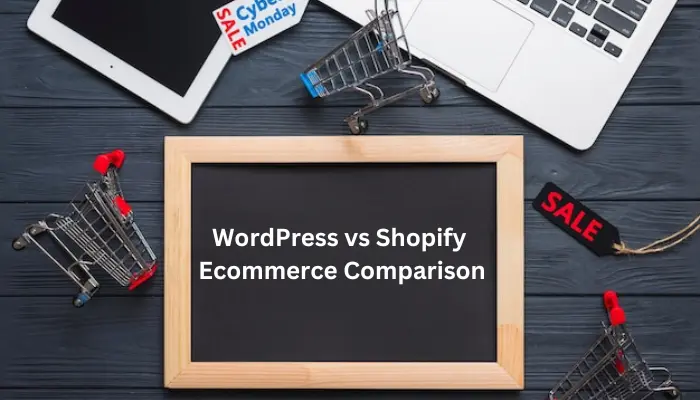Local SEO Services Near Me | Local Pro1 Welcome to...
WordPress vs. Shopify: Choosing the Right Platform for Your Online Business
WordPress vs Shopify| Choosing the Right Platform for Your Online Business
WordPress and Shopify are two distinct yet widely-used platforms for creating websites and online stores. WordPress, a highly versatile content management system (CMS), powers a significant portion of websites on the internet, offering extensive customization options through themes and plugins, making it suitable for various purposes, from blogs to corporate websites. In contrast, Shopify is a dedicated e-commerce platform tailored for online retail, known for its user-friendly interface, e-commerce-specific features like inventory management and secure payment processing, and a thriving app ecosystem. Local Pro1 will provide you the best wordpress and shopify services as you require.

WordPress vs Shopify: Pricing and Value
Breakdown of WordPress Costs:
Domain: The cost of a domain name can vary widely but typically ranges from $10 to $50 per year, depending on the domain registrar and the domain’s popularity.
Hosting: Hosting prices vary based on the hosting provider and the plan you choose. Shared hosting plans can start as low as $3 to $10 per month, while managed WordPress hosting and VPS hosting can range from $20 to $100 or more per month.
Themes: WordPress offers both free and premium themes. Free themes are, as the name suggests, free, while premium themes can cost anywhere from $20 to $100 or more as a one-time fee.
Plugins: WordPress has a vast library of free plugins, but premium plugins can cost anywhere from $10 to hundreds of dollars, depending on their functionality and complexity. Some premium plugins also operate on a subscription model.
Value Proposition (WordPress):
Customization: WordPress provides extensive customization options. You can create a highly tailored website to meet your specific needs.
Ownership: You have full control over your website, including design, content, and data.
Scalability: WordPress is highly scalable and can be adapted to grow with your business.
Community Support: There is a large community of users and developers, so you can find help and resources easily.
Content Management: WordPress is renowned for its powerful content management capabilities.
Shopify Pricing:
Shopify Lite: $9 per month – Allows you to sell on social media and add buy buttons to an existing website.
Basic Shopify: $29 per month – Includes the basics for setting up an online store.
Shopify: $79 per month – Offers additional features like gift cards and professional reports.
Advanced Shopify: $299 per month – Geared towards larger businesses, with advanced reporting and third-party calculated shipping rates.
Shopify Plus: Pricing varies but is typically suitable for high-volume businesses with custom requirements.
Value Proposition (Shopify):
Ease of Use: Shopify is known for its user-friendly interface, making it easy for beginners to set up and manage an online store.
Security: Shopify takes care of security, including SSL certificates, to ensure your customers’ data is protected.
Hosting: Hosting is included in all plans, eliminating the need to find and manage a separate hosting provider.
App Store: Shopify offers a wide range of apps and integrations to enhance your store’s functionality.
Scalability: As your business grows, you can easily upgrade to a higher-tier plan with more features.
WordPress vs Shopify - Ecommerce Comparison

WordPress for Ecommerce:
Overview of WooCommerce Plugin:
- Woo Commerce is a free, open-source plugin for WordPress that transforms your standard WordPress website into a fully functional ecommerce store.
- It offers a wide range of features, including the ability to sell physical and digital products, manage inventory, process payments, and handle shipping and tax calculations.
- Woo Commerce is highly customizable through themes and extensions, allowing you to create a unique and tailored online store.
Strengths and Limitations for Ecommerce:
Flexibility: WordPress/Woo Commerce is extremely flexible and can be used for a variety of ecommerce business types, from small boutiques to large online retailers.
Customization: You have complete control over the look and functionality of your store through WordPress themes and Woo Commerce extensions.
Content Marketing: WordPress’s strong blogging capabilities enable you to create content that can help with SEO services and marketing efforts.
Cost: While the base Woo Commerce plugin is free, you may need to invest in themes and extensions for advanced functionality.
Limitations:
Complexity: Setting up and maintaining a WordPress/WooCommerce store can be more complex compared to Shopify, especially for those without technical skills.
Security: You are responsible for the security of your WordPress site, including plugin and theme updates.
Hosting: You need to find and manage your own hosting, which can be a technical challenge.
Scalability: While it can handle large stores, the performance may require more optimization as your store grows.
Shopify for Ecommerce:
Features Tailored for Online Stores:
- Shopify is a dedicated ecommerce platform, so it comes with a comprehensive set of features specifically designed for online stores.
- It offers an easy-to-use, drag-and-drop store builder, making it accessible for users with limited technical knowledge.
- Shopify provides tools for inventory management, payment processing, shipping, SEO optimization, and more.
- It has a wide range of professionally designed themes and a robust app store for added functionality.
Advantages and Limitations for Ecommerce:
Advantages:
Ease of Use: Shopify is known for its user-friendly interface, making it a great choice for beginners.
Security and Reliability: Shopify handles security, hosting, and updates, ensuring a secure and stable platform.
Scalability: It can easily scale with your business, from small startups to large enterprises.
Limitations:
Cost: Shopify has monthly fees, and transaction fees if not using Shopify Payments, which can add up over time.
Customization: While Shopify allows for customization, it may not be as flexible as WordPress/WooCommerce for highly unique requirements.
Data Portability: Moving away from Shopify can be challenging due to proprietary systems.
WordPress vs Shopify Templates

WordPress Templates:
Types of WordPress Themes Available: WordPress offers a wide range of themes, including both free and premium options. These themes cater to various niches and industries, making it possible to find a theme that suits your specific needs. There are themes designed for blogs, e-commerce, portfolios, business websites, and more. Additionally, you can choose from thousands of third-party themes available on marketplaces like ThemeForest.
Customization Options and Flexibility: WordPress is known for its flexibility and customization options. You can customize WordPress themes extensively using the built-in Customizer, allowing you to modify colors, fonts, layouts, and more. Moreover, you can utilize page builders like Elementor, Divi, or Beaver Builder to create highly customized designs without coding knowledge. If you have coding skills, you can further extend and customize themes by editing the code directly.
Shopify Templates:
Shopify’s Theme Offerings: Shopify also offers a variety of themes for online stores. They provide both free and premium themes, and these themes are specifically designed for e-commerce. Each theme is optimized for product listings, shopping cart functionality, and other essential e-commerce features. Shopify’s theme store provides a selection of themes to suit different industries and styles.
Customization Capabilities and Ease of Use: Shopify is known for its user-friendly interface. While it may not offer the same level of design flexibility as WordPress, it excels in ease of use, particularly for those without coding experience. You can customize Shopify themes through the theme editor, which provides options for adjusting colors, fonts, and layout elements. Additionally, Shopify offers a user-friendly drag-and-drop builder called Shopify Sections, which allows for simple customization of theme elements.
Comparison:
- WordPress is highly flexible and can be adapted to various types of websites beyond just e-commerce, while Shopify is focused primarily on e-commerce.
- WordPress requires more technical knowledge, especially if you want to make extensive customizations or build complex websites. Shopify, on the other hand, is designed to be more user-friendly, making it a better choice for beginners.
- Shopify themes are pre-optimized for e-commerce, which can save time and effort for online store owners. In contrast, WordPress themes may require more setup to enable e-commerce functionality through plugins like WooCommerce.
- WordPress offers a broader range of themes due to its versatility, but this can also mean more research to find the perfect theme. Shopify’s themes are more specialized for online selling.
Which Platform is Right for You?
Business Goals and Needs:
Content vs. E-commerce: WordPress is a versatile content management system (CMS) suitable for blogs, news websites, portfolios, and more. If your primary focus is content creation and blogging, WordPress might be the better choice. Shopify, on the other hand, is specifically designed for e-commerce, making it an excellent choice for businesses primarily selling products online.
Scalability: Consider the long-term growth of your business. Shopify is known for its scalability and can handle high volumes of products and traffic. If you anticipate significant growth, Shopify might be the better option.
Customization: WordPress is highly customizable with thousands of themes and plugins available, allowing you to create a unique website tailored to your needs. Shopify offers customization but is more focused on e-commerce functionality, so if extensive customization is a priority, WordPress might be preferable.
Technical Expertise:
Ease of Use: WordPress is generally considered more user-friendly for beginners and those without much technical expertise. If you’re new to website development, you might find it easier to get started with WordPress.
Coding Skills: Shopify often requires less coding knowledge to set up and maintain an online store, making it suitable for individuals or businesses with limited coding skills. WordPress can be more code-intensive for advanced customizations.
Maintenance: WordPress websites may require more regular updates and maintenance due to the frequent release of plugins and themes. Shopify handles most technical maintenance aspects, reducing the workload on your end.
Budget Considerations:
Initial Costs: WordPress is open-source software, so you can download and use it for free. However, you’ll need to pay for web hosting, themes, and plugins, which can vary in price. Shopify, on the other hand, has a monthly subscription fee that covers hosting, security, and basic e-commerce functionality.
Transaction Fees: Shopify charges transaction fees on sales made through third-party payment gateways if you don’t use their in-house payment system (Shopify Payments). WordPress typically doesn’t charge transaction fees, but your payment gateway might.
Total Cost of Ownership: Consider the long-term costs, including hosting, maintenance, and any premium themes or plugins you may need. Shopify’s pricing structure is more straightforward, while WordPress costs can vary widely depending on your choices.
Ultimately, the choice between WordPress and Shopify should align with your specific business goals, technical capabilities, and budget constraints. It’s essential to thoroughly assess your needs and priorities before making a decision, and you can also consult with web development professionals for personalized guidance.
Conclusion
WordPress and Shopify are both powerful platforms, but they serve different purposes in the world of website and e-commerce development. WordPress, with its flexibility and extensive range of plugins, is an excellent choice for those who want complete control over their website’s design and functionality. It’s ideal for bloggers, content creators, and businesses looking to build a robust online presence. Feel free to contact us for any type of query or services related to wordpress or shopify development.
FAQs
What Is WordPress?
WordPress is a versatile content management system (CMS) that allows users to create and manage websites. It offers a wide range of customization options and supports various plugins and themes.
What Is Shopify?
Shopify is an e-commerce platform that enables users to create online stores and sell products. It provides a user-friendly interface, integrated payment gateways, and hosting services tailored for e-commerce needs.
What Are The Main Differences Between WordPress And Shopify?
WordPress is primarily a CMS that can be used for various types of websites, including e-commerce, whereas Shopify is specifically designed for building online stores. WordPress offers more flexibility and customization options, while Shopify provides a more streamlined and specialised e-commerce experience.
Which Platform Is Better For Beginners?
Shopify is often considered more beginner-friendly due to its intuitive interface and built-in e-commerce features. It requires less technical knowledge to set up and manage compared to WordPress, which may involve more customization and maintenance tasks.
Which Platform Offers More Flexibility For Customization?
WordPress offers greater flexibility for customization since it is a general-purpose CMS with thousands of plugins and themes available for enhancing functionality and design. Users can fully customise their websites according to their specific needs and preferences. Shopify, while customizable, may have limitations compared to WordPress in terms of design and functionality customization.
Our Services
Our Latest Posts
PPC White Label Services by Local Pro1 | Expert Solutions
PPC White Label Services by Local Pro1 | Expert Solutions...



